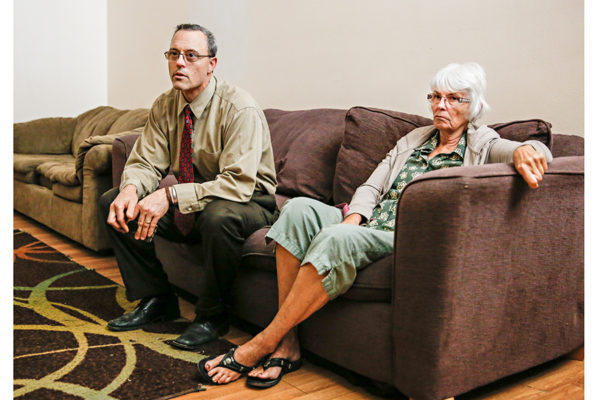Two Tales of Treatment as Youth Facility Closes Amid Abuse Allegations
State’s removal of 27 children from Ranch for Kids signals sea change for youth treatment industry
By Tristan Scott
REXFORD — Set against a backdrop of rolling foothills and forested mountains, the 140-acre Ranch for Kids was nearly deserted on a recent Friday morning, days after state health officials and law enforcement intervened to remove 27 children from the youth treatment facility, yanking its license and affirming a decade of reports detailing abuse.
According to administrators with the Department of Public Health and Human Services (DPHHS), the unprecedented move was in response to allegations of “egregious, chronic and persistent child abuse and neglect,” including instances of students being physically hit, kicked, body slammed and spit on by staff.
Other allegations the state leveled at the Ranch for Kids involved a staff member shooting a nail gun at students, and brought to light the program’s practice of forcing students on 15-20 mile, all-night treks along U.S. Forest Service roads.
The program’s founders and staff are adamant in their denials of the reports and expressed confidence that a fuller version of the story will soon emerge. They’re appealing the state’s license suspension, and said the children sent to their treatment facility — most of whom suffered exposure to alcohol in utero — suffer from a spectrum of cognitive and behavioral disorders that are beyond the scope of what the general public can comprehend.
Joyce Sterkel, the program’s founder who retired in 2013 and was succeeded as executive director by her son, Bill Sutley, said the state DPHHS is conducting an “absolute witch hunt” as it assumes licensing authority over private treatment programs for the first time.

As of July 1, a new state law transferred authority of the Private Alternative Adolescent Residential and Outdoor Program (PAARP) to DPHHS. Prior to July 1, DPHHS did not have licensing authority over such programs, which fell under the auspices of the Department of Labor and Industry. Three weeks after the transfer, authorities converged on the Ranch for Kids property and removed the program’s entire population of boys and girls, whose ages ranged from 11 to 17.
“We have not abused children in this program,” Sterkel said, explaining that parents of the residents understand there is sometimes a “tough love” approach to discipline. “Children are held accountable for their behavior.”
Still, on the Ranch for Kids campus located off U.S. Highway 93 just north of Eureka, remaining staff members volunteered details that aligned closely with the state’s allegations.
John Webb, 19, who drove a four-wheeler around the sprawling property clearing brush on July 26, explained that he’d come to the program a half-decade earlier, sent here by his adoptive parents who live in Texas. Now he works for the Ranch for Kids doing handyman work, but says he doesn’t receive compensation beyond room and board.
Webb said he was surprised by the scale of the response, which involved 20 child welfare workers who removed the children, as well as 15 law enforcement officers and a tactical team assembled in the event there was a confrontation, according to a Department of Justice spokesperson.

However, Webb said he was “not at all surprised” by the outcome.
“I’ve known this day was coming,” he said, taking a break from his chores and leaning against some steel fencing. “The things I’ve seen, this place was definitely shutdown worthy.”
Both as a program applicant and in his current capacity, Webb said he personally witnessed a former staff member shoot a nail gun at children in what he described as a sort of intimidation tactic. He also said he disagreed with the forced all-night marches through nearby forests, which he described as being facilitated by an escort car that crept along behind the children.
“I don’t think people should be sending children on 20-mile walks, especially at night,” he said. “One of my friends saw a mountain lion.”
The most frequent form of physical abuse that Webb encountered involved staff’s attempts to restrain children during especially violent outbursts. Those attempts to de-escalate behaviors or intervene when a child posed a threat to themselves or others frequently went “too far,” Webb said.
“There’s a right way to do it and a wrong way to do it,” he said. “They were doing it the wrong way. They took it too far. They’d body slam someone and pin them down and push their knee into their back. That’s not what is supposed to happen.”
“If they asked me, I’d go against them. I’d go against the program,” he added.
At staff quarters, a woman who was packing up her belongings said she felt “misled” when she accepted a position at Ranch for Kids last year, unaware that the program accepted children on such an extreme end of the Fetal Alcohol Spectrum Disorder, an umbrella term to describe the range of effects that can occur in someone whose mother drank alcohol during pregnancy, but did not hire staff with a requisite amount of training and experience.
The effects of Fetal Alcohol Spectrum Disorder may include physical, mental, behavioral and learning disabilities with lifelong implications, and the employee, who asked not to be named out of fear for repercussion, said staff were unequipped to handle the children when their behavior turned violent.
Since opening two decades ago, the Ranch for Kids has gained national and global attention as it accepted hundreds of foreign adoptees into its tucked-away therapeutic setting, with special attention paid to the high volume of program applicants who hail from Russia, generating stories in the New York Times and on CNN.
International adoptions from Russia and other Eastern European countries skyrocketed in the 1990s after the Soviet Union dissolved, and more than 47,000 Russian children were adopted in the United States between 1998 and 2009.
Because alcoholism is the most frequent cause for removal of children from their biological mothers in Russia, those adoptees are at a greater risk of having fetal alcohol syndrome. One report estimates that the rate of fetal alcohol syndrome in Russian orphanages is eight times the worldwide average.
Sterkel knows firsthand the scourge of alcoholism on that nation’s children. She worked as a midwife in Russia from 1992 to 1994 and delivered hundreds of babies with FASD before adopting three children of her own, two boys and a girl, all of whom have FASD and are now fully grown and independent.
The Sterkel family’s success with their children led other parents to seek assistance, and between 1999 and 2002 numerous children came to live on the family ranch. In 2003, Sterkel realized the need for a full-time professional staff and separate facility and created the Ranch for Kids Project.
She said not only can children on this spectrum who have suffered such a high degree of trauma lie and be manipulative, but their lack of impulse control can turn violent.
The Ranch for Kids has also garnered scrutiny from critics who question the effectiveness of its approach, and dispute its total lack of licensed therapists, psychologists or psychiatrists.
In 2012, a team of Russian government officials and a television crew from Moscow turned up at the Ranch for Kids’ property. Led by Pavel Astakhov, the country’s children’s rights commissioner, who had alleged mistreatment of children at the ranch and called it a “trash can for unwanted children,” the group wanted to see the children’s conditions. Instead, he was turned away at the gate and subsequently called for the facility to be shut down.
It was a high-profile moment, but Sterkel maintained she had nothing to hide.
Yet troubles continued to brew between the Ranch for Kids and state officials, some of them revealed in a pair of lawsuits between the program and the state Department of Labor and Industry in charge of overseeing such programs until a month ago.
In one case, the state argued the Ranch for Kids was not complying with licensing requirements through the PAARP board, a five-member, self-regulating oversight panel that consisted of three leaders in the youth treatment industry in Montana as well as two members of the public.
In 2010, the now-dissolved PAARP board declined to renew the ranch’s provisional license, even as Sterkel countered that her organization was affiliated with a ministry and not subject to state licensing requirements. The Ranch for Kids continued operating without a license, and PAARP issued a cease-and-desist order in June 2011 demanding the facility quit operating.

A separate lawsuit focused on building code issues dating back to 2009, when state building inspector Rick Cockrell traveled to the Ranch for Kids with members of the state’s Building Codes Bureau, a fire marshal and a Lincoln County law enforcement officer to conduct an inspection.
Cockrell requested the presence of law enforcement, he stated in a sworn affidavit, because of what he perceived as threatening behavior by Sutley, Sterkel’s son and the current executive director at the Ranch for Kids. Sutley refused to allow the inspection, and the Department of Labor and Industry responded with a lawsuit.
In addition to that pattern of locking horns with state officials, the facility has been dogged by allegations of mistreatment dating back a decade, according state and county law officials.
DPHHS Deputy Director Laura Smith said the investigation was sparked in June by a call to the agency’s abuse and neglect hotline, which is at 1-866-820-KIDS (5437). That led to a full child welfare investigation and numerous interviews that corroborated the information, including with former staff, students, neighbors, Forest Service workers, and other witnesses.
“This is one of the most complex child welfare investigations and operational events we have ever conducted at our agency, and we are extremely grateful for our partnerships with other agencies, particularly law enforcement and approximately 20 child welfare workers who were extremely professional in ensuring that these kids feel safe,” Smith said.
Officials say they obtained information that included allegations of students being physically hit, kicked, body slammed and spit on by staff; staff inflicting persistent psychological abuse on children; staff using excessive discipline, including the long walks on remote roads in harsh conditions, with improper or no shoes, withholding food, shooting a nail gun at a student, and prolonged isolation; children not receiving medical attention when it was critically needed; and medications not properly administered, stored or regulated.

Runaways also were not reported in a consistent or timely manner to law enforcement, even in harsh winter conditions, according to the DPHHS.
Lincoln County Sheriff Darren Short, who assisted the Department of Justice with the removal of the children from the Ranch for Kids, said his deputies responded to a report of three runaways from the facility one day before the response.
He said his office has been responding to complaints related to the Ranch for Kids for years.
“There have been quite a few complaints over the years, most of which were detailed in the affidavit of probable cause for the license suspension,” he said, referring to a document that is currently under seal. “The main issue was dealing with runaways who would get into trouble. But we also had some complaints of mistreatment.”
John Barnes, a spokesperson for the Department of Justice and Attorney General’s office, said officials are in the process of interviewing all of the children and reuniting them with their families.
“There is a criminal investigation that has essentially just begun. The first step was the removal of the children and getting them to a safe place where we could address their immediate needs,” Barnes said. “The next step is interviewing them, which requires a special skill set that our officers possess.”
Barnes said no one he’s talked to at the Department of Justice can remember such an extensive case involving allegations of child abuse.
“This isn’t something that any of our people recall having been involved in, at least not in recent history,” he said. “Something on this scale, I think it could be a new thing.”
Barnes declined to discuss whether or not similar investigations are underway into the state’s 13 other private youth treatment programs, but attributed the swift action to the new legislation shifting authority and oversight to DPHHS.
“Prior to that law, all complaints went to that kind of strange oversight board at the Department of Labor that was composed of representatives of the industry itself,” he said. “I can’t help but wonder if there were complaints involving allegations of abusive or criminal behavior that were directed to the board and never went anywhere. All I can say is that it’s interesting what has come up in the last couple of days, and what might come up in the future.”
Sen. Diane Sands, D-Missoula, carried the legislation that shifted authority to DPHHS, a measure that has been introduced every session for a decade. Similar measures have received staunch opposition from industry advocates and lobbyists for religious freedom, though an investigative series by the Missoulian detailing the industry’s lack of oversight helped gain support for the measure this time around.
“I think it’s telling that such a significant case emerged just three weeks after this law taking effect,” Sands said. “I was frankly thrilled when I heard about this because the stories that we have heard that take place in some of these facilities, not all of them, are terrifying. I hope this puts other facilities on alert that we will not accept the mistreatment of these children. We don’t approve of the kind of physical and psychological abuse that is accounted for with these children. We don’t accept this as a society.”